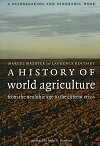Marxist Ecology
The Nature of the Contradiction
The social relation of capital, as we all know, is a contradictory one. These contradictions, though stemming from capitalism’s internal laws of motion, extend out to phenomena that are usually conceived as external to the system, threatening the integrity of the entire biosphere and everything within it as a result of capital’s relentless expansion. How to understand capitalism’s ecological contradictions has therefore become a subject of heated debate among socialists. Two crucial issues in this debate are: (1) must ecological crisis lead to economic crisis under capitalism?, and (2) to what extent is there an ecological contradiction at the heart of capitalist society? | more…

Only once we understand the long history of human efforts to draw sustenance from the land can we grasp the nature of the crisis that faces humankind today, as hundreds of millions of people are faced with famine or flight from the land. From Neolithic times through the earliest civilizations of the ancient near East, in savannahs, river valleys and the terraces created by the Incas in the Andean mountains, an increasing range of agricultural techniques have developed in response to very different conditions. These developments are recounted in this book, with detailed attention to the ways in which plants, animals, soil, climate, and society have interacted. | more…
In a 1963 talk on “The Pollution of Our Environment” Rachel Carson drew a close comparison between the reluctance of society in the late twentieth century to embrace the full implications of ecological theory and the resistance in the Victorian era to Darwin’s theory of evolution: As I look back through history I find a parallel. I ask you to recall the uproar that followed Charles Darwin’s announcement of his theories of evolution. The concept of man’s origin from pre-existing forms was hotly and emotionally denied, and the denials came not only from the lay public, but from Darwin’s peers in science. Only after many years did the concepts set forth in The Origin of Species become firmly established. Today, it would be hard to find any person of education who would deny the facts of evolution. Yet so many of us deny the obvious corollary: that man is affected by the same environmental influences that control the lives of all the many thousands of other species to which he is related by evolutionary ties (Lost Woods: The Discovered Writing of Rachel Carson, pp. 244-45). | more…
Does ecology need Marx? I wonder, at this point, what ecology is, for it seems to be an umbrella term, like sexism or racism, which covers a variety of macrolevel and microlevel phenomena produced by different causes and lends itself to the development of a wide variety of conflicting ideologies and theoretical frameworks. I would prefer to change the question to the following: Are Marx and Marxism contingent or essential in the struggles against environmental degradation and all forms of exploitation and oppression? | more…
The standard solution offered to the environmental problem in advanced capitalist economies is to shift technology in a more benign direction: more energy-efficient production, cars that get better mileage, replacement of fossil fuels with solar power, and recycling of resources. Other environmental reforms, such as reductions in population growth and even cuts in consumption, are often advocated as well. The magic bullet of technology, however, is by far the favorite, seeming to hold out the possibility of environmental improvement with the least effect on the smooth working of the capitalist machine. The 1997 International Kyoto Protocol on global warming, designed to limit the greenhouse-gas emissions of nations, has only reinforced this attitude, encouraging many environmental advocates in the United States (including Al Gore in his presidential campaign) to advocate technological improvement in energy efficiency as the main escape from the environmental mess. | more…
“Oh no, not another great, thick, fat book on Marx!” thought Richard Lewontin when he saw this new book by John Bellamy Foster. I have to confess (despite the fact that I, too, have written a big book on Marxism) to a similar reaction. However, as he goes on to say in the book’s blurb, “as soon as I started to read, I found it hard to put down.” With this, too, I concur | more…
Paul Burkett, Marx and Nature: A Red and Green Perspective (New York: St. Martin’s Press, 1999), 312 pp., $45, hardcover.
If there is a single charge that has served to unify all criticism of Marx in recent decades, it is the charge of “Prometheanism.” Although Marx’s admiration for Aeschylus’ Prometheus Bound and his attraction to Prometheus as a revolutionary figure of Greek mythology has long been known, the accusation that Marx’s work contained at its heart a “Promethean motif,” and that this constituted the principal weakness of his entire analysis, seems to have derived its contemporary influence mainly from Leszek Kolakowski’s Main Currents of Marxism. The first volume of this work was drafted in Polish in 1968 and appeared in English in 1978. | more…

The political economy of toxic waste was summed up by Lawrence Summers—then chief economist at the World Bank, later U.S. Treasury Secretary—in his notorious claim that poor people live in environments that are, from an economic point of view, not sufficiently polluted. In its ceaseless search for profit, the toxic waste industry now routinely endangers the health of people around the worlds and the planet itself. | more…
The conventional view that agriculture was displaced by industry in two stages—by the industrial revolution in the late nineteenth century, and as a result of the rise of the agribusiness system in the mid-twentieth century—has left many observers of the contemporary political economy with the impression that to deal with agriculture is essentially to focus on political-economic history rather than contemporary political economy. Nothing could be further from the truth. The purpose of this special issue of MR is to help compensate for the neglect that agriculture has often suffered in political-economic literature of the late twentieth century. In so doing we will continue with a line of argument that was introduced in MR more than a decade ago in the July-August 1986 special issue Science, Technology, and Capitalism, edited by Steffie Woolhandler and David Himmelstein, which included landmark essays on U.S. agriculture and agricultural research by Richard Lewontin and Jean-Pierre Berlan | more…
One of the problems that has most troubled analysts of global ecological crisis is the question of scale. How momentous is the ecological crisis? Is the survival of the human species in question? What about life in general? Are the basic biogeochemical cycles of the planet vulnerable? Although few now deny that there is such a thing as an environmental crisis, or that it is in some sense global in character, some rational scientists insist that it is wrong to say that life itself, much less the planet, is seriously threatened. Even the mass extinction of species, it is pointed out, has previously occurred in evolutionary history. Critics of environmentalism (often themselves claiming to be environmentalists) have frequently used these rational reservations on the part of scientists to brand the environmental movement as “apocalyptic.” | more…
It has, unfortunately, taken far too long for Marxists to take environmental issues seriously. There are some good reasons for this, including the undoubtedly “bourgeois” flavor of many of the issues politicized under that heading (such as “quality of life” for the relatively affluent, romanticism of nature, and sentimentality about animals) and the middle class domination of environmental movements. Against this, it must also be recognised that communist/socialist government have often ignored environmental issues to their own detriment (the pollution of Lake Baikal, the destruction of the Aral Sea, deforestation in China, being environmental disasters commensurate with many of those attributable to capitalism). Environmental issues must be taken seriously. The only interesting question is how to do it | more…

In recent years John Bellamy Foster has emerged as a leading theorist of the Marxist perspective on ecology. His seminal book Marx’s Ecology (Monthly Review Press, 2000) discusses the place of ecological issues within the intellectual history of Marxism and on the philosophical foundations of a Marxist ecology, and has become a major point of reference in ecological debates. This historical and philosophical focus is now supplemented by more direct political engagement in his new book, Ecology Against Capitalism. In a broad-ranging treatment of contemporary ecological politics, Foster deals with such issues as pollution, sustainable development, technological responses to environmental crisis, population growth, soil fertility, the preservation of ancient forests, and the “new economy” of the Internet age. | more…


